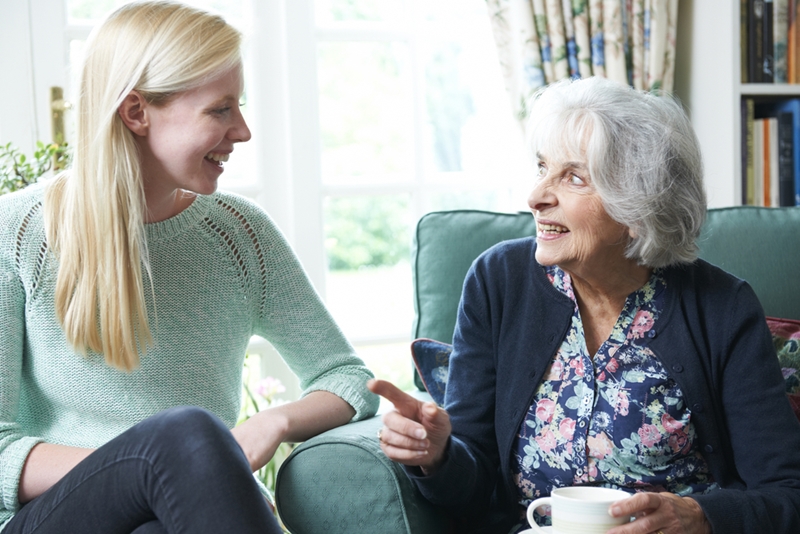If your mother or father is moving in with you and your family, you want them to feel as comfortable as possible. However, simply making up a bed and putting their clothes away won’t be enough. It’s important that your home is senior-friendly well before your parents or loved ones step inside. Regardless of their quality of life, certain tools and home additions can put them and you at ease. Consider these tips on how to prepare your home to accommodate an elderly loved one.
Fire safety
While your house may seem like an organized and safe place, things become drastically different when seniors come into your home. There will be times that you may have to leave your elderly loved ones alone with your children or by themselves, and you don’t want to get any alarming calls while you’re away. You may assume they won’t forget to turn off the stove or can walk up and down stairs, but you might be surprised by what challenges them each day. There are several things in your home that may seem OK now but are hazardous to seniors. The first precaution to consider is fire safety. Do you have a working fire extinguisher you or a loved one could use in case of an emergency and do they know how to use it? You should also ask, what objects could be flammable that are near hot surfaces?
 You may want to have stove plates to protect the burners from getting too hot and organize flammable objects so they sit far away from the stove. Review fire safety with your parents so they remember to turn off burners and lights when needed. Go over a fire escape route so loved ones know what to do if you’re not home. Lastly, make sure you have working smoke detectors as well as carbon monoxide detectors.
You may want to have stove plates to protect the burners from getting too hot and organize flammable objects so they sit far away from the stove. Review fire safety with your parents so they remember to turn off burners and lights when needed. Go over a fire escape route so loved ones know what to do if you’re not home. Lastly, make sure you have working smoke detectors as well as carbon monoxide detectors.
Slip-free zone
Seniors don’t have the agility they used to when they were younger. While it might be easy for you to walk down a flight of stairs or jump in and out of the shower, it’s not the same for them. Certain items that may seem OK are actually very slippery, and seniors may need extra guidance as they move around. If you aren’t home for a few days, you will want to make ensure they can do daily tasks without issue.
Put non-slip mats in showers and tubs and install handles so that loved ones can get in and out of the shower on their own with ease. Make sure the dry mat outside the shower also has a good grip. If all of your bedrooms are on the second floor, think about creating a bedroom on the first floor so it’s easier for your parents to get around. Climbing stairs can be difficult and may put serious strain on arthritic joints. If you have smaller sets of stairs around the house, including at the entrance, think about installing ramps to make it easier with a walker or cane. If your loved ones use mobility devices, make sure they have a good rubber grip for getting around. Install handrails in downstairs bathrooms as well, this will make it easier to get on and off the toilet.
Get organized
Before seniors arrive, it’s time to organize your home so there aren’t any tripping hazards. Purchase bins to put pet or children’s toys in. Pick up wires and tape them to the ground or wall to prevent them from getting in the way. Get rid of raised doorway thresholds. Place non skid mats under rugs and ensure that loose carpets don’t have any edges that loved ones could get caught on. Place the remotes in a spot that’s easy for loved ones to find. You may want to consider getting a mobile and home phone with big buttons that are easy for seniors to dial. Put away knives and other sharp objects in a well-organized rack or drawer. Make sure plates and pots and pans are at an accessible level for your loved ones to reach if they decide to cook or just desire a quick snack.
Let there be light
Sometimes seniors’ eyesight isn’t as great as it used to be. That’s why it’s always important to have adequate lighting around the home. Make sure there are plenty of hallway lights if seniors tend to get up in the middle of the night. There should be light switches at the end of each hallway and at the top and bottom of the stairs. Bathrooms should also be well lit to prevent accidents. Consider installing automatic or motion-sensor lights that turn on when someone walks into a room. That way older adults don’t have to worry about searching for a light if they aren’t familiar with your home. This is also a good way to prevent a fire hazard, as seniors may forget to turn lights off at night.
If you found an error, highlight it and press Shift + Enter or click here to inform us.




